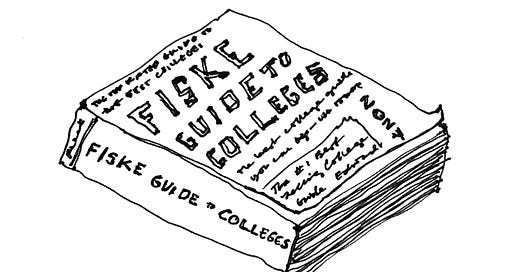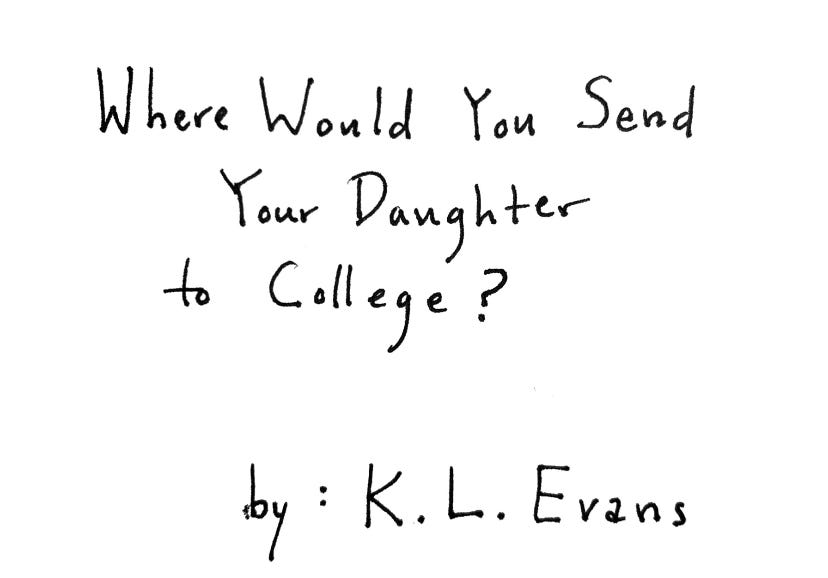Where Would You Send Your Daughter to College?
For the college admissions season, a guest post.
I’m home from college this week. A year ago I was “huddled sadly over my desk answering college supplemental questions,” making and retooling lists of schools as I gained and lost interest. I found my original list today, a curious document because I ended up applying to only two or three of those schools. I imagine how different my life would be right now if I’d applied differently, or chosen differently. A common affliction of the new college student, I guess. Remembering the months I spent hunched over this computer screen writing to schools (really, admissions officers given mere minutes to understand a life) I remembered how much I thought about the whole process—how much my mom thought about the whole process. She’s a lifelong teacher, once a college professor, my homeschooling parent, school nurse and gym teacher for a brief but glorious time. As admissions season heaves into view, here’s my mom on that disquieting time for parents, the autumn of their discontent.
Where would you send your daughter to college? That’s what I kept asking friends and those working professors I knew who still had ears for the mingled skepticism and hope of my appeal. I was and was not speaking rhetorically. I had a seventeen year old daughter, and though I couldn’t “send” her anywhere—I didn’t have the dough—she had a choice to make. (If that is the right way to describe the fierce, dispiriting business of undergraduate admissions.) Yet mine was an older, murkier question about how to raise children and send them into the world. That a college education has come to feel indistinguishable from rough entry into the unscrupulous universe was part of the problem.
People close to me knew I was not asking where my diligent, dazzling kid would find worthy friends and mentors (anywhere, really) or where she could acquire pre-professional gloss and fluency in a specialized field (the prescribed curriculum and prospective career augured by admission to the country’s preeminent universities) but more absurdly, where a promising young person might stumble upon and gradually assemble the kind of education which has in fact become an impediment to professional achievement. I’m alluding to the unpredictable, risky scheme of humane learning where students are encouraged to bear up under the deforming forces of convention and corruption and take up the question, ‘How should I live my life?’
Willingness to address the problem of how to conduct oneself is what distinguishes education from technical or professional training. When we don’t know or wish to learn the perennial questions that vex human beings (as opposed to formulating and facing them as did Socrates, Thomas More, and other exemplary characters who suffered for their principles, who found something in their way of life without which life was valueless) we lose both a means of clearly seeing ourselves and models against which to measure ourselves. We’re thrown back on our lowest, least satisfying speculations and tactics.
I want my daughter to grab hold of that notion before it is gone for good. Naturally there is plenty of expensive schooling that fills young adults with “a lofty and vain expectation that they have learned some things” as Plato writes in the Seventh Letter. But that’s not the real end of education, which as Plato portrayed it helps unseeing, irrational humans transcend the limitations of perspective and cast off at least some of their self-delusions. An edifying ‘turning about of the soul’ is indispensable to the extent that it alters our routine ways of seeing things. It turns our faces again towards the original. It forces open what we had thought closed.
I’m not talking about youthful zeal for finding cracks in the surface of culture or engaging in extended wearying ideological struggle, but what happens when students learn to move themselves around if they wish to understand something—when they question their regular tendencies or look again at the practices and associated presumptions they take as given. It isn’t familiarity with a new subject that education advances so much as the possibility of a new self.
Pathetic idealist, you say. Dreamer. Stuff of novels. Novels no one reads.
As it happens, my daughter is inclined to use books, especially books of fiction, to understand herself and her world. Anyway, there’s no reason a quixotic undertaking can’t also be realistic. I began my quest with eyes open.
My small circle was crammed with academics and I too was familiar with the business in which I had for a long time and with genuine pleasure been deeply embedded. I had friends. They said things. I knew something about how to expose the university and how to defend it. I was not given to cultural despair but I could see that the country’s leading institutions had lost their hold against hostile forces—that what in the eighties Saul Bellow called the “disheartening expansion of trained ignorance and bad thought” had worsened and spread. Management was restructuring.
Especially in the humanities. Rather than learn to sort self-knowledge from self-interest, unlucky undergraduates are emboldened to live as they please. Flimsier academic requirements yet more rigid orthodoxy on college campuses separates further the aims of profitable degree-granting institutions from the authentic concerns of the people who attend them. More students are denied the pleasure and concentrated labor of attending to individual works, especially those that do not present a doctrine but (like Plato’s playful, intricately wrought dialogues) help readers think. Instead, students learn that all books can be studied under a single approved method: as expressions of the biases of their authors. They focus on general problems rather than concrete cases. They retreat further into theory and abstraction, speak in buzzy catchwords and jargon, signal an expertise vast but indefinite.
Teachers who used to show how reading well and widely can meet the deepest of human needs—how time spent poring over perplexing texts really does help one appreciate views different from one’s own—now appear eager to boost students’ sense of self-importance and applaud their inflamed, ever escalating sensitivities. Few people talk about (and fewer read) the demanding, invigorating books that show what the human possibilities are, that awaken thoughtful people to what Bellow in his 1976 Nobel lecture calls “an immense, painful longing for a broader, more flexible, fuller, more coherent, more comprehensive account of what we human beings are, who we are, and what this life is for.”
What’s more, no one is having fun. No one is speaking openly. The newer generations of students and even professors can’t understand how edifying talk can be enjoyable. They’ve forgotten how to tease each other nimbly and without offense. They’ve lost trust in one another’s ability to investigate all views. People speak tactlessly and also without sensitivity to the disseminative potency of language, the medium of conscious life. Perhaps because they don’t think about language as the outer face and strictly the only decipherable expression of what is going on inside their heads, they are unaware that the way they, like, speak communicates a great deal more than they imagine—how it offers telling evidence of what my computer scientist friend calls “a problem with the operating system.”
About the university today I feel what in the seventies music critic Lester Bangs felt about the state of Rock and Roll—that it’s bankrupt, bust. And like Bangs I depend on unsneering kids who won’t believe that. In Cameron Crowe’s coming-of-age film Almost Famous (2000), a fictionalized Bangs (Phillip Seymour Hoffman) tells earnest fifteen-year old William (Patrick Fugit), an aspiring rock journalist, that his writing is “damn good. It’s just a shame you missed out on Rock and Roll. It’s over.”
“Over?”
“Over. I mean you got here just in time for the death rattle. The last gasp. Last grope.”
“At least I’m here for that.”
If meaningful general education for undergraduate students is coming to an end, I figure my daughter can at least see the residue of intellectually and spiritually engaged learning, catch the last lungful of consequential talk. With luck she will meet in person those paradoxical and contentious characters still committed to safeguarding reason from the calculation of self-interest, still addressing the permanent questions continually and seriously, still devoted to the old structure of the university, the ideal university, what Allan Bloom calls “an unpopular institution in our midst that sets clarity above well-being…that resists our powerful urges and temptations, that is free of all snobbism but has standards.”
There are no slick tours of the unpopular institution. No Fiske Guide. Since there isn’t a measurable difference in the appetites and motives of people working inside the university and those working outside of it, we might be seeking a chimera. But aren’t there some institutions more likely to house the kinds of eccentric, erudite teachers my daughter shrewdly knows she needs, or are those living embodiments of learning a thing of the past, beings that live on only in fiction?
I have yet to find an answer to this embarrassing question. The experience my daughter is after is impossible to advertise or solicit for: “Attractive bookish teenager seeks extensive, detailed, and ungrudging help rediscovering the peculiar value of literature in a culture such as ours, its power to act as a perpetual rebuke and source of aggravation to whichever regime happens to dominate. And dignified employment. Can do funny voices.”
Where in high tech America, with its think tanks and pointless surveys and protein pouches, its industrious vacuous uptalking army of young achievers, is there a chance of learning the reading strategy Socrates in the Republic dubs “looking at everything everywhere,” the unshackling ritual of taking absolute notice of whatever one is looking at, a mode of attention that trades showy or fueled debate (which amplifies students’ ready contempt and compounds their foolishness, that punishes charity and rewards indignation) for unassuming investigation. What am I looking at? Am I in any doubt? What have I missed? The skilled reader’s journey is slowed by a willingness to be surprised, taken aback—to think again about one’s beliefs and inclinations under the illuming, slanted light that a powerful contrary imagination can cast upon them.
The cheering fact is that this education doesn’t cost much. All it requires are lively, friendly, adroit young people who spend their time reading together and talking to one another about the lives they wish to lead.
On the other hand, the desire for what might be called a philosopher’s education isn’t shared by most people. It’s painful to discover there are alternatives to the way we do things. That’s what the Apology of Socrates was meant to remind us of: hostility to philosophy is the natural disposition of human beings. The story of Socrates is a story about philosophic activity and why it is worth protecting and how easy it is to wipe out. Cancel. Scrub. Take him out, boys!
There’s the rub. Am I encouraging my perceptive, tenderhearted daughter to become someone who pains and so makes indignant and eventually menacing the people around her? That was the conclusion which emerged from years spent teaching and observing students and raising children and scrutinizing people drawn to the new university and indulged there. It is also a very old story.
I think often of an exchange I had with my advisor in graduate school—Kenny Dauber, the kindest, smartest teacher I know. Kenny calls this story apocryphal, something I invented to shed light on an obscurity. But I distinctly recall sitting in his office and fuming over a passage we were reading together, the King James translation of Genesis 22: 1-3, the Binding of Isaac.
The Old Testament scene is unforgettable: God orders Abraham to sacrifice his only son Isaac. Abraham binds Isaac to an altar and begins to comply—but is at the last minute stopped by an entity appearing on behalf of God. A ram is slaughtered instead. God applauds Abraham’s pious obedience.
The passage is bedeviling. Many commentators conclude that Abraham’s willingness to sacrifice his son shows the extent of man’s ability to love and fear God, that Abraham’s actions are proof he’s ready to fulfill any of God’s commands. Others argue that Abraham never really intended to sacrifice Isaac, and that readers are meant to be disturbed and horrified by the thought. A few go so far as to suggest that Isaac himself must have been traumatized and angry, just like many new readers of this story.
Countless people get hopping mad when they first encounter this passage, and I was one of them. I should say I was a promising but inexpert scholar, more at home on the beaches of New Zealand or Honolulu. I knew more professional surfers and skateboarders than I did observant Jews. In any case I had not yet discovered that truly skillful readers, for example Kierkegaard, have attempted to inhabit the scene of Isaac’s binding—to construct various scenarios which could justify what Abraham was about to do—and failed. There is no getting past nor making sense of God’s command: “Take now thy son, thine only son Isaac, whom thou lovest, and get thee into the land of Moriah; and offer him there for a burnt offering . . . ”
As Kenny would say now, there is no discourse that can explain Abraham. Every attempt at explanation in the ordinary sense is futile. Abraham’s motives are not known, not discussable (unlike Agamemnon, for example, sacrificing his daughter for the benefit of his community). But what I remember him saying then was that I was reading too literally or not reading deftly a Biblical passage that had rhetorical purpose, that was expressly designed not to explain something but to excite readers’ curiosity and occasion questions. My task wasn’t to argue about Abraham’s willingness to sacrifice Isaac but to figure out what to do with that incontrovertible fact. I had to move myself around to discover what problems the reading prompted or gave rise to.
What the Binding of Isaac brought out that day has to do with what parents owe children, whom we love, and who we nevertheless have to send off to places that are often not loving, that (unlike parents) are neither capable of nor intended for protection. Sending lambs to slaughter, in short. But what to do? Make our children less attentive, less affectionate, less yielding—more guarded, cynical, unaware, callous, and so with a better chance of going unscathed? Not really a choice, is it? Not one I’ll ever know how to make.








